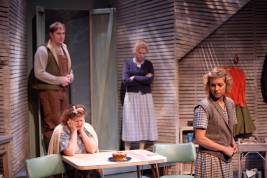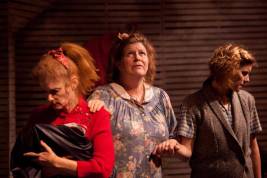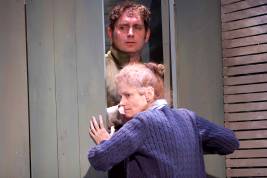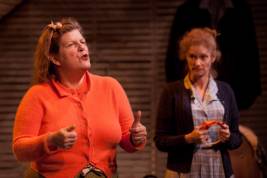NOT RECOMMENDED
When deciding whether to spend an hour and a half with a trio of loony Irish sisters in Enda Walsh’s The New Electric Ballroom, the latest production of the multiple award-winning Rogue Machine, you might want to ask yourself how important it is for you to understand what’s happening onstage when watching a play. How important is it for you that a story should unfold in some kind of recognizable reality? How willing are you to suspend disbelief, ignore confusion, and simply go with the flow?
 StageSceneLA regulars can probably guess this reviewer’s answers to the above questions, or at least those among you who’ve perused the website’s FAQs, where I write, “You won’t often find me seeing avant garde, artsy, experimental theater—not my thing.”
StageSceneLA regulars can probably guess this reviewer’s answers to the above questions, or at least those among you who’ve perused the website’s FAQs, where I write, “You won’t often find me seeing avant garde, artsy, experimental theater—not my thing.”
Why then, you might wonder, did I choose to review The New Electric Ballroom, a play which fits quite neatly into the above categories?
In point of fact, I went in knowing little about The New Electric Ballroom other than that it was the latest from the much esteemed Rogue Machine, that its director and cast had impressed me time and again in the past, and that Monday-night performances made it an easy fit into a busy reviewing schedule.
Fortunately, I don’t have to hit myself on the head and paraphrase “I coulda had a V8” with something like, “I coulda seen [insert name of play I coulda seen],” there being little else I could have opted for on a Monday in June. Fortunately, too, a quartet of dazzling performances made the experience of sitting through Walsh’s surreal maze of a play far from unbearable. As directed with assurance and style by John Perrin Flynn, performed with passion and depth by Tim Cummings, Casey Kramer, Lisa Pelikan, and Betsy Zajko, and designed with authenticity and flair by a superb team of Southern California’s finest, The New Electric Ballroom has much going on in its favor. I’m just not sure I can recommend it to anyone whose tastes run similar to mine.
 In a nutshell, Walsh’s 2005 drama centers around three Irish spinsters, two of them in their sixties, the third a mere forty, who spend much of their time either monologuing ad infinitum about their past or chitchatting about this, that, or the other thing in words other reviewers have described as poetic. Into this bizarre mix is thrown the nightly drama of reliving a key moment in the older sisters’ youth, a moment in which all their hopes and dreams were dashed and the duo sentenced to a life of lunacy. Apparently something happened in the backstage dressing room of The New Electric Ballroom some twenty-plus years ago, something involving a traveling, Elvis-like rock-n-roller, something that has kept Clara and Breda housebound ever since with their co-dependent younger sister Ada helping to facilitate their recurring time-travel back to that traumatic night.
In a nutshell, Walsh’s 2005 drama centers around three Irish spinsters, two of them in their sixties, the third a mere forty, who spend much of their time either monologuing ad infinitum about their past or chitchatting about this, that, or the other thing in words other reviewers have described as poetic. Into this bizarre mix is thrown the nightly drama of reliving a key moment in the older sisters’ youth, a moment in which all their hopes and dreams were dashed and the duo sentenced to a life of lunacy. Apparently something happened in the backstage dressing room of The New Electric Ballroom some twenty-plus years ago, something involving a traveling, Elvis-like rock-n-roller, something that has kept Clara and Breda housebound ever since with their co-dependent younger sister Ada helping to facilitate their recurring time-travel back to that traumatic night.
These nightly excursions involve donning outfits that have apparently been hanging on the sisters’ kitchen walls for the past couple decades as one of the three presses the play button on an equally ancient cassette tape recorder to provide a soundtrack to their reminiscences.
 A fourth character pops into the sisters’ lives on a daily basis, fishmonger Patsy, who in his own way is every bit as bizarre as the three ladies he visits. In a pivotal moment, he too dons one of the costumes, that of the pop idol who broke their hearts, and serenades them with a cover of Billy Fury’s 1960 hit “Wondrous Place,” wearing the black pleather suit that’s been up there hanging between Clara’s and Breda’s vintage skirts and sweaters. (Whether they stole the ensemble from the heartthrob’s dressing room, or went shopping for a similar outfit before their self-imposed confinement is anyone’s guess, as is the question of how any of the three could possibly fit into it.)
A fourth character pops into the sisters’ lives on a daily basis, fishmonger Patsy, who in his own way is every bit as bizarre as the three ladies he visits. In a pivotal moment, he too dons one of the costumes, that of the pop idol who broke their hearts, and serenades them with a cover of Billy Fury’s 1960 hit “Wondrous Place,” wearing the black pleather suit that’s been up there hanging between Clara’s and Breda’s vintage skirts and sweaters. (Whether they stole the ensemble from the heartthrob’s dressing room, or went shopping for a similar outfit before their self-imposed confinement is anyone’s guess, as is the question of how any of the three could possibly fit into it.)
I’m told that playwright Walsh doesn’t particularly mind if even his actors haven’t the foggiest what’s going on in The New Electric Ballroom, and whether that’s true or not, it wouldn’t surprise me. I, by contrast, prefer a bit more clarity in my theatergoing experience. I’ve also never been a fan of overly talky plays, and talky this one indeed is. It even opens with middle sister Clara facing away from us and talking to a wall, and talking, and talking about what I couldn’t tell you if my life depended on it. And what the heck is up with that lipstick smear?
What I can say without reservation is that astonishing work is being done on the Rogue Machine stage by Kramer as Clara, Pelikan as Breda, Zajko as Ada, and Cummings as Patsy. In fact, you won’t find four better, richer performances in town that those delivered by these four actors, and Cummings reveals some incredible pipes when crooning “Lonely Place.”
 Then there’s scenic designer Stephanie Kerley Schwartz’s superbly conceived and executed kitchen set, dressed with minute attention to detail by Hazel Huang. Dianne K. Graebner’s costumes speak volumes about the lives of these four lonely souls. Adam Phelan’s multi-layered sound design transports us back in time to that pivotal night so many years back (though I do find it unlikely that any of the sisters would have the technical knowhow to put it all on cassette). Best of all is Leigh Allen’s lighting, which goes from the starkly realistic to the romantically fanciful when recreating the ambiance of that long-ago evening at the New Electric Ballroom. Accents seem to this reviewer to be spot-on, thanks to four gifted actors working with dialect coach Tyler Seiple.
Then there’s scenic designer Stephanie Kerley Schwartz’s superbly conceived and executed kitchen set, dressed with minute attention to detail by Hazel Huang. Dianne K. Graebner’s costumes speak volumes about the lives of these four lonely souls. Adam Phelan’s multi-layered sound design transports us back in time to that pivotal night so many years back (though I do find it unlikely that any of the sisters would have the technical knowhow to put it all on cassette). Best of all is Leigh Allen’s lighting, which goes from the starkly realistic to the romantically fanciful when recreating the ambiance of that long-ago evening at the New Electric Ballroom. Accents seem to this reviewer to be spot-on, thanks to four gifted actors working with dialect coach Tyler Seiple.
Jan O’Connor and Becky Wu are assistant directors. Ramón Valdez is stage manager and David Mauer technical director. The New Electric Ballroom is produced by Flynn, Elina de Santos, and Edward Tournier.
Critics have waxed eloquent about previous productions of The New Electric Ballroom, and my best guess is that Rogue Machine will score numerous raves for this latest staging of Walsh’s surreal fairy tale. If you’re anything like this reviewer, however, The New Electric Ballroom will probably not be your Irish cup of tea.
Rogue Machine at Theatre/Theater, 5041 Pico Blvd., Los Angeles. Through July 30. Saturdays at 5:00. Sundays at 7:00. Mondays at 8:00. No performances Monday June 25 or July 23. Reservations: 855 585-5185
www.roguemachinetheatre.com
–Steven Stanley
June 18, 2012
Photos: John Flynn


 Since 2007, Steven Stanley's StageSceneLA.com has spotlighted the best in Southern California theater via reviews, interviews, and its annual StageSceneLA Scenies.
Since 2007, Steven Stanley's StageSceneLA.com has spotlighted the best in Southern California theater via reviews, interviews, and its annual StageSceneLA Scenies.







 COPYRIGHT 2024 STEVEN STANLEY :: DESIGN BY
COPYRIGHT 2024 STEVEN STANLEY :: DESIGN BY